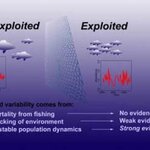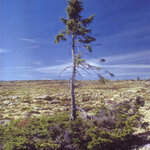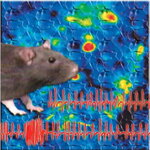Ecology & Zoology

Fishing activities can provoke volatile fluctuations in the populations they target, namely by altering the “age pyramid.” Lopping off the few large, older fish that make up the top of the pyramid leaves a broad base of faster-growing small younglings and the research team found that this rapidly growing and transitory base is dynamically unstable — a finding having profound implications for the ecosystem and the fishing industries built upon it.
Imagine a container of water with a 500-pound fish. With food, it grows a little bigger. Without food it gets a bit smaller. Imagine the same…

Female fruit flies sometimes choose males who are aggresive, sometimes choose males who do not fight at all, and sometimes choose males for no reason science can explain, write a team of biologists, and the findings help explain the large variation in aggressiveness in most species, including humans.
So females are unpredictable, which means the fittest males don’t always get the girl. This explains why males don't evolve towards super-aggressiveness.
“If aggression makes you more likely to father children, all males should be selected to be very aggressive. Male fruit flies (like humans and…

Half a century after the last earth-shattering atomic blast shook the Pacific atoll of Bikini, the corals are flourishing again. Some coral species, however, appear to be locally extinct.
These are the findings of a remarkable investigation by an international team of scientists from Australia, Germany, Italy, Hawaii and the Marshall Islands. The expedition examined the diversity and abundance of marine life in the atoll.
One of the most interesting aspects is that the team dived into the vast Bravo Crater left in 1954 by the most powerful American atom bomb ever exploded (15 megatonnes - a…

Succession is one of the first things that students learn about in ecology. Each intervening stage modifies the environment in such a way that lays the groundwork for the next stage, while making the environment less hospitable to its own offspring. Only the final stage is self-perpetuating and stable.
Frederic Clements, one of the pioneers of community ecology, saw ecological succession as an ontogenic process in which the community - a superorganism - developed into its final, mature form. The orderly progression from bare ground to mature forest is orderly, progressive…and very Victorian…

The world’s oldest recorded tree is a 9,550 year old spruce in the Dalarna province of Sweden.
The spruce tree has shown to be a tenacious survivor that has endured by growing between erect trees and smaller bushes in pace with the dramatic climate changes over time.
For many years the spruce tree has been regarded as a relative newcomer in the Swedish mountain region.
”Our results have shown the complete opposite, that the spruce is one of the oldest known trees in the mountain range,” says Leif Kullman, Professor of Physical Geography at Umeå University.
The world’s oldest recorded tree…

140 milliseconds. So in less time than it took you to read those two words a rat knew everything he needed to know about what his nose detected.
Daniel Wesson and colleagues from Boston University write that rats are able to discriminate odors much more quickly than previously thought.
Odor perception in mammals begins when olfactory sensory neurons in the animal's nose detect an odor molecule and then transmit that information to the brain. The first brain area to receive these signals is the olfactory bulb, where the sensory neurons end in small structures called glomeruli. Olfactory…

Researchers have confirmed the first case of a frog without lungs - the aquatic frog Barbourula kalimantanensis apparently gets all the oxygen it needs through its skin. Previously known from only two specimens, two new populations of the aquatic frog were found during a recent expedition to Indonesian Borneo.
Of all tetrapods (animals with four limbs), lunglessness is only known to occur in amphibians. There are many lungless salamanders and a single species of caecilian, a limbless amphibian resembling an earthworm, known to science. The complete loss of lungs is a particularly rare…

Researchers from Spain and Croatia led an investigation into the peculiar lifestyle of numerous spider species, which live, feed, breed and ‘walk’ in an upside-down hanging position. According to their results, such ‘unconventional’ enterprise drives a shape in spiders that confers high energy efficiency, as in oscillatory pendulums.
The great majority of land animals evolved to use the ground as the main support for their motion. Accordingly, they evolved legs capable of supporting the weight of their whole bodies, enabling them to move around with their heads above their feet.
However,…

When people think about the destruction and degradation of tropical forests, they tend to focus on rainforests. Tropical dry forests tend to get overlooked. They aren’t as striking - no cathedral-like understorey, no mind-boggling biodiversity. But more importantly, they often just aren’t there. Over much of their potential range they have simply been erased from the landscape. They may have covered as much as 42% of the land area in the tropics1, but have been reduced to less than 27% of their former range in Mexico2, and as little as 2% in Central America3 and New Caledonia4.
Despite this…

As the planet's population continues to grow, optimal crops need to be planted and harvested in order to feed people. One concern about widespread use of 'organic' cropping is that it would raise the price of food and have lower yields. Right now only rich people can afford organic food but if lower yields were worldwide only rich people could afford food at all, say critics.
It's not a huge issue, at least for some crops, say scientists at the University of Wisconsin-Madison and agricultural consulting firm AGSTAT. They say organic cropping systems are as productive as conventional…